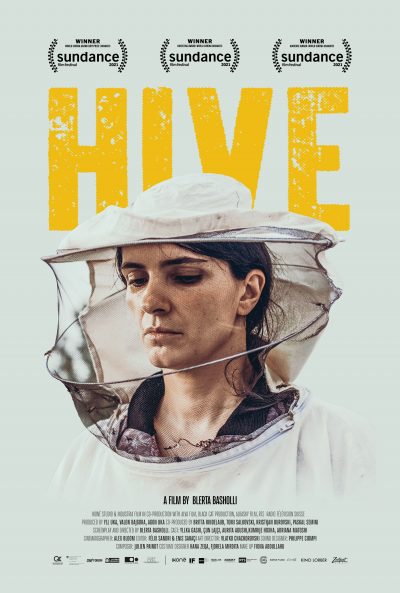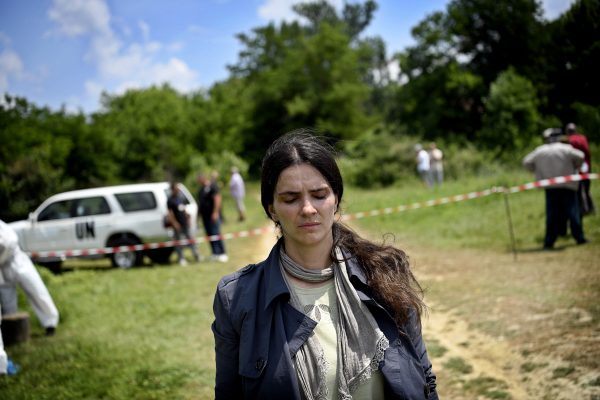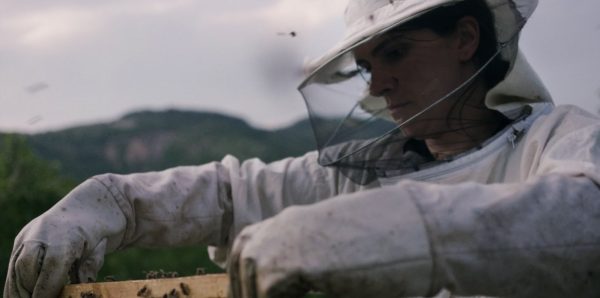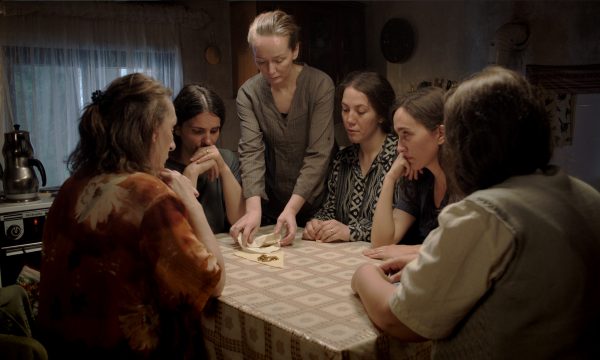
“Hive” (“Zgjoi”) (2021). Cast: Yllka Gashi, Çun Lajçi, Kaona Sylejmani, Mal Niah Sadqiu, Shkelqim Islami, Astrit Kabashi, Kumrije Huxha, Adriana Matochi, Molikë Maxhuni, Blerta Ismaili, Armend Smajli. Director: Blerta Basholli. Screenplay: Blerta Basholli. Web site. Trailer.
When life beats us down, it can be nearly impossible to pick ourselves up off the ground. With so much holding us back, we may be unable to know how to go about it or even where to start. Yet, if we’re to carry on, we somehow have to figure out how to summon up the courage, hope and determination to move forward. Such is the experience of a group of wartime survivors as seen in the troubling yet inspiring new fact-based drama, “Hive” (“Zgjoi”).
When the madness of war mercilessly tears families apart, the survivors are left to pick up the pieces, a process that can sometimes be far more complicated than one might expect. So it was for the women of Kosovo in the wake of the tiny Balkan republic’s bombardment by neighboring Serbia in 1999, a conflict that resulted in the “disappearance” of many of the nation’s husbands and fathers, leaving their wives and mothers to carry on. But their efforts to do so were often thwarted by a misogynistic culture that sought to prevent them from engaging in anything other than the traditional roles they typically played, including earning a living even in the ubiquitous absence of male breadwinners.
Such is the story of Fahrije Hoti (Yllka Gashi), wife of Agimi (Armend Smajli), mother of two children, a teenage daughter, Zana (Kaona Sylejmani), and a young son, Edoni (Mal Niah Sadqiu), and caregiver to her aging and ailing father-in-law, Haxhiu (Çun Lajçi). In 1999, the family’s town of Krusha e Madhe was stormed by invading forces in which many of the men were summarily rounded up and taken away. Their fates were officially unknown, even though most everyone knew that they had been killed, their bodies dumped in mass graves or a nearby river. This left many families, including the Hoti household, without husbands, fathers and incomes.
While the United Nations stepped in to search for the missing in the wake of the unspeakable carnage, the process was slow, and, in most cases, all that was found were badly decomposed remains and remnants of tattered clothing – not much to work with when it came to making definitive identification of who was found. And, after seven frustrating years of few meaningful results, the survivors of the lost needed to get on with their lives, particularly generating income to keep their family households afloat. Given who was left behind, this was a task that fell to the women, but most attempts aimed at making a living were met with fierce opposition from the remaining men of the village.
The region’s longstanding chauvinistic mindset maintained that women were supposed to clean the house, cook the meals and rear the children only, not engage in prohibited pursuits like starting businesses or even driving cars. After all, these clueless sexists believed, what would their men think once they finally returned home and found their women doing such heinous things? Free-thinking attitudes like this were incontrovertible evidence that these disobedient women were inherently untrustworthy, raising the specter that they were also probably involved in all manner of other nefarious and lascivious activities. This scorn toward them led to acts of violence against them and their property, as well as rampant namecalling that earned them such disparaging labels as “whore.”

Nevertheless, bills had to be paid, and food had to be put on the table. To earn money, Fahrije initially took over the beekeeping operation launched by Agimi, producing honey sold by Haxhiu in the local market. But, even though it produced a modest income, it wasn’t enough. And, compared to many of her peers, Fahrije was fortunate to be earning anything. The women of Krusha e Madhe clearly had to do something to support themselves, despite the obstacles.
With the assistance of a local women’s organization, Fahrije and a group of her kindreds banded together to form a company that manufactured ajvar, a relish made from red peppers and eggplants, which they sold in a local supermarket. They faced numerous challenges, such as vandalism of their delivery vehicle (Fahrije’s car) and attempted sexual abuse by a local produce wholesaler (Astrit Kabashi). They also went to great lengths to keep the business afloat, such as pooling their funds from the sale of family jewelry. But they remained committed, sticking together and drawing from the strength of Fahrije and Nazmije (Kumrije Huxha), the wise old matriarch of the group.
Through it all, in addition to the ongoing financial and cultural challenges, the women also had personal issues to deal with. Fahrije, for example, still had a family to care for, including an often-belligerent adolescent daughter and a father-in-law who vociferously tried to dissuade her from her “dangerous” ventures. Then there was the frustrating ongoing search for Agimi’s remains, a process aided by a forensic investigator (Shkelqim Islami) who, unfortunately, repeatedly failed to obtain a DNA sample from Haxhiu, a tool that could potentially expedite the matter and at last put the issue to rest. This, of course, perpetuated the profound grief that Fahrije felt over the disappearance of her husband and the lingering doubt about what actually happened to him. This all made for quite a full plate.
However, the collective strength of the group helped to keep the business going at a time when its continued existence was essential. Indeed, cooperation and teamwork can be powerful forces to counteract the perils that surround us, as the women of this village learned for themselves. Like the bees who kept their hives thriving, this determined collective did the same, not only for themselves, but also for their sense of hope for a better future.
The burdens placed on Fahrije and the other women of her village are unimaginable. Difficulties in just one of these areas would be challenging enough, but, considering the myriad issues they’re up against, it’s almost inconceivable to fathom how they could possibly carry on. Missing husbands, economic hardship, unresolved grief and relentless ignorance-based harassment represent quite an array of adversity, but what can the women do under these circumstances? Simply giving up is not an option, so something has to be done. But what? And how?

Overcoming obstacles as overwhelming and pervasive as these is indeed possible, but success depends on one’s ability to become convinced about the prospect. And that, in turn, rests with one’s beliefs, the building blocks of one’s reality according to the conscious creation process, the philosophy that makes such manifestations possible. Embracing that notion is imperative in Fahrije’s case, as everything she and her collaborators hope to achieve depends on it.
For starters, the women of Fahrije’s collective must adopt beliefs that rid them of fears and limitations, impediments that could easily hold them back from attaining any of their goals. And, in light of their circumstances, they have an abundance of potential fear- and limitation-based beliefs to vanquish, any of which could undercut their aims. However, given the power of their motivations and the depth of their needs, they also have ample inspiration and impetus to drive the formation of suitable beliefs designed to overcome these undermining influences and enable them to fulfill their objectives.
Once armed with ample courage, fortitude and determination and free of the hindrances that had long held them back, the women were then able to allocate their energies to the development of beliefs aimed at helping them envision possibilities and creative solutions that they previously had been unable to do. This led to the formation of their support group, then the idea to start a business, and then the means to make its formation, development and growth possible. It also enabled them to stand up to those who tried to undermine their efforts, to put the naysayers in their place, and to allow them to come into their own as fully actualized individuals, savvy entrepreneurs and empowered heroes.
Undoubtedly this all came about largely as a result of the individual strivings of Fahrije and her colleagues. But it also resulted from their collective efforts, their ability to work jointly in committed acts of co-creation, not unlike the bees in Fahrije’s hives. By pooling their belief resources, they were able to significantly amplify the magnitude of their intentions, making it possible to not only achieve, but also to exceed, their expectations. That certainly proved comforting, at least when it came to addressing their everyday basic survival needs. And, with that matter covered, it freed up resources to work on beliefs and solutions for their personal considerations, such as their efforts aimed at searching for their lost spouses and dealing with their long-unresolved grief, concerns that were hard to attend to when faced with issues as fundamental as putting food on the table.

Most importantly, though, these creative efforts helped to put Fahrije and the other women on a firm footing for the future. It may not have restored what they lost, but it provided them with a foundation on which they could build new lives for themselves and their families. Even their culture was impacted by the introduction of progressive new ideas, concepts designed to help sweep away archaic, outmoded notions that benefitted only a privileged few and kept the remainder of society on the outside looking in. In the process, they realized gains for their gender, as well as the ability to exercise the joy and power of creation for the betterment of themselves and their society, quite an accomplishment from humble beginnings.
Director Blerta Basholli’s fact-based debut feature hits all of the right notes with this inspired yet troubling offering. Its unique combination of raw emotions, steely determination and supportive sisterhood make for a one-of-a-kind viewing experience, one that’s sure to draw out an array of heartfelt feelings and stirring responses from viewing audiences. The film’s striking cinematography and superb script are genuine stand-outs, placing viewers squarely in the circumstances faced by the finely crafted ensemble of characters. But perhaps its greatest asset is the masterful lead performance of Yllka Gashi as the beleaguered but defiant protagonist. With world events being what they are at the moment, this outstanding release reminds us all too poignantly about what we face in the wake of these insane, misguided catastrophes and the difficulty of coming back from them, a challenge that calls for an abundance of commitment and determination in the face of adversely unrelenting circumstances. The film is currently playing in limited theatrical release and is available for streaming online.
While “Hive” hasn’t earned any major awards season accolades (despite having been shortlisted as Kosovo’s submission for the Academy Awards’ best international film), it has nevertheless fared well on the film festival circuit. The picture has earned 17 wins and an additional 11 nominations in international competitions around the globe, quite an accomplishment for a first-time narrative feature filmmaker. That should say something about the quality and merits of this fine debut production.
The uplifting example set by the women of Krusha e Madhe should inspire anyone who has come up against adversity and needs to determine how to carry on. The challenges they managed to overcome make many of those that we face pale by comparison. It’s hard to imagine how they could have vanquished everything that they did, but, when our circumstances necessitate us having to do so, somehow we manage to find the inner strength and suitable supporting beliefs to make it happen. We should remember that the next time our backs are against the wall. After all, if these courageous souls can rise up to meet their circumstances, there’s no reason why any of the rest of us can’t – especially when we seemingly have no other choice available to us.
Copyright © 2022, by Brent Marchant. All rights reserved.

No comments:
Post a Comment